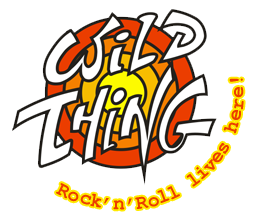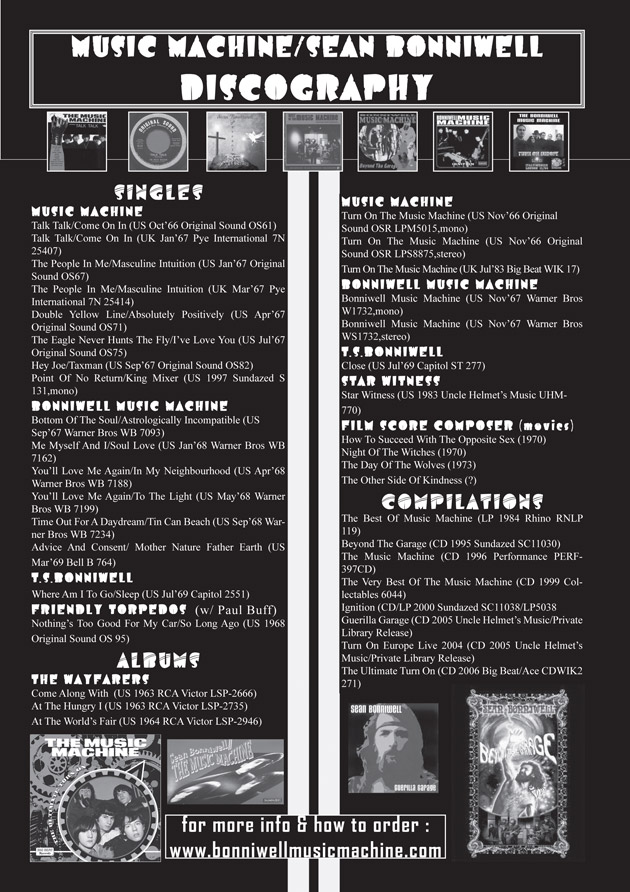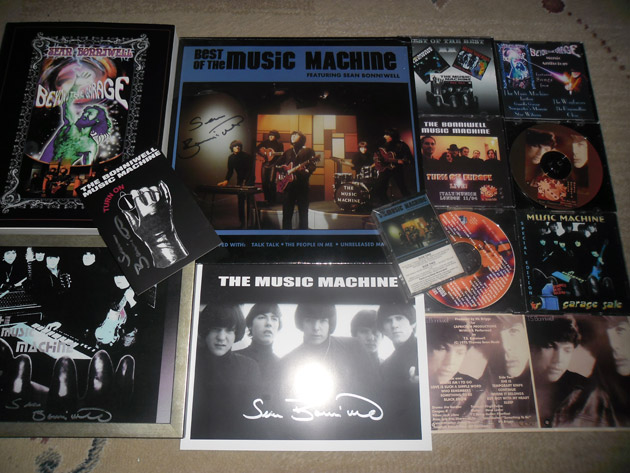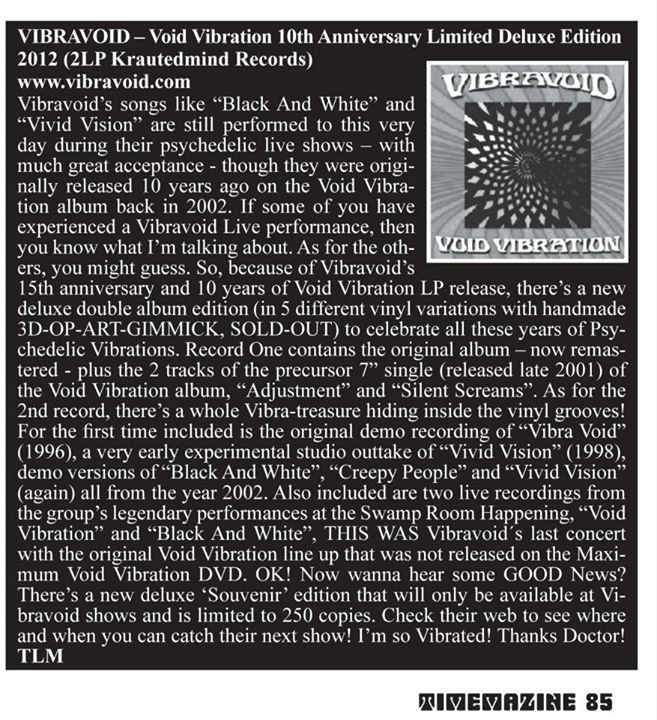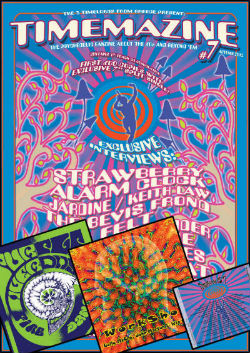
Sean Bonniwell (16 Αυγ.1940 – 20 Δεκ.2011)
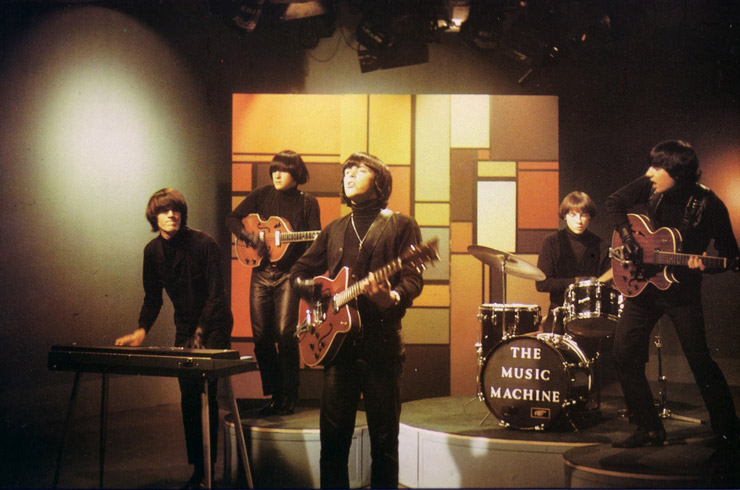
Ένας ένας φεύγουν λοιπόν… Έρχεται η σειρά τους να ενσωματωθούν και αυτοί στη μεγαλύτερη μπάντα του πλανήτη, την Big Heavens Band. Ξέρεις, πάντα είναι δύσκολο να δεχτείς την «απώλεια» ενός ανθρώπου που με τα τραγούδια του, τις μουσικές του σε συντρόφευε τόσα χρόνια. Βέβαια γίνεται ακόμα πιο δύσκολη η κατάσταση όταν έχεις μια «κάποια» σχέση με τον εκλιπόντα, έστω και «διαδικτυακή». Ο Sean άφησε την τελευταία του πνοή, ένα βράδυ του Δεκέμβρη, στο Ιατρικό Κέντρο της Visalia (California) σε ηλικία 71 χρόνων. Καρκίνος στον πνεύμονα…
Μία, λοιπόν, από τις σημαντικότερες στιγμές στα έξι χρόνια που ζει και αναπνέει το φανζινάκι μας - TimeMazine - ήταν και η συνέντευξη/συνομιλία που έκανα με τον Sean, το καλοκαίρι του 2007. Θεώρησα τεράστια τιμή (και ακόμα το θεωρώ φυσικά) να μπορέσω να συνομιλήσω, να ρωτήσω, να εκφράσω απορίες στον ίδιο τον «Νονό» του πανκ ("Godfather of Punk"), αν και στην πορεία της κουβεντούλας μας μου είπε πως προτιμά να αναφέρονται στους Music Machine σαν "Progenitors of Art Rock". Θα παραθέσω λοιπόν κάποια αποσπάσματα από την 10σέλιδη συνέντευξη, και δεν θα μπω στο τριπάκι του να μεταφράσω τις απαντήσεις του, δεν θα ήθελα μέσα στα στενά όρια μιας ξερής μετάφρασης, να χαθεί η σοφία, το πάθος, η μαγεία που εξέπεμπε ο Sean.
(Σημείωση: Για εσάς που δεν έχετε το 2ο τεύχος του TimeMazine υπάρχουν ακόμα κάποιες κόπιες, οπότε όσοι πιστοί… προσέλθετε)
Αποσπάσματα από την Συνέντευξη του Sean Bonniwell που δημοσιεύτηκε το Νοέμβρη του 2007, στο 2ο τεύχος του TimeMazine:
TM: Can you please explain this one: “If I hadn’t had the basic instincts of a boomerang, I’d have left the Wayfarers after the first 2 weeks”.
 Sean Bonniwell: I think the propelling motive for inventing my own style of rock’n’roll was a combination of frustration and artistic ambition. The first that comes to mind was the conservative nature of folk music. Not the lyrical content, because the lyrical content was definitely anti-establishment at the time. But the conservative musical style of the times built up in me a frustration that I could really do nothing to stop from releasing. Even in the latter days of the Wayfarers and that of the folk era, when I was on the road, I started writing and planning the Music Machine - although I hadn’t thought of the name. The image, the sound and the musical approach was taking shape even then (1964). The Wayfarers were held to a standard of what they perceived as commercial conservatism, in keeping with their image. This wouldn’t allow me to express myself in terms of progressive musicality, although the third and last album for RCA features some of my influence in the song arrangements.
Sean Bonniwell: I think the propelling motive for inventing my own style of rock’n’roll was a combination of frustration and artistic ambition. The first that comes to mind was the conservative nature of folk music. Not the lyrical content, because the lyrical content was definitely anti-establishment at the time. But the conservative musical style of the times built up in me a frustration that I could really do nothing to stop from releasing. Even in the latter days of the Wayfarers and that of the folk era, when I was on the road, I started writing and planning the Music Machine - although I hadn’t thought of the name. The image, the sound and the musical approach was taking shape even then (1964). The Wayfarers were held to a standard of what they perceived as commercial conservatism, in keeping with their image. This wouldn’t allow me to express myself in terms of progressive musicality, although the third and last album for RCA features some of my influence in the song arrangements.
The idea of electrifying folk instruments was an idea whose time had come. Basically, early rock’n’roll was really electrified folk music, which explains why the lyrical content of so many of the songs were political (aside from the pop commercialism, the majority of the push or motive for the songs was really a need to express the changing times). The first ‘folk rock’ ever heard on the radio was "Walk Right In", if I had to point to the most influential song and sound leading and inspiring me, that would be it; the Roof Top Singers’ slightly overdriven twelve string was musically revolutionary.
TM: As a teenager you were neurotic, dark and idealistic! You were the "mind" of the Music Machine, all black dressed, black hair too, one glove and no covers! Pretty weird for that year/era. Why’s that? A hard thing to do is to track down your influences!
SB: I’m not sure I’d characterize the MM as having a 'dark side', except to say that defining social injustice and greed can be interpreted as reactionary. My songs threw the cement and dirty laundry, in with the orange juice and cookies... and the 60’s counter culture provided the means for me to express this with no limitations or prefabricated expectations. We weren’t imitating a style, we were inventing one. Even if there had been someone around to discourage us from inter-fusing all this into 'garage rock', we would have ignored them. We were aiming at the moon and shooting for the stars. Using amps with broken speakers and piece-meal equipment we invented ourselves, was just the way it was; we didn’t sound like anybody else, we didn’t want to. I have to say there were problems with the commercial aspects of playing original music in the mid-’60s, for a band who didn’t have a national identity. It’s very much the same today. The clubs wanted cover bands. It was okay if you did it in your own style, but they wanted you to play the Top 40. As a trio, which is how the Music Machine started out - as the Ragamuffins, I took a lot of flack because of the original music. But it was the original music that jump-started the Machine. We could tell that by the reaction of the crowds... it was like a metamorphosis. There was a completely different type of audience that was coming to see us on a regular basis.
TM: I believe that a part of this experimentation was the recording of "Hey Joe". A much more slow down version unlike the other ones (Byrds, Leaves, Love). You definitely predated the version of Hendrix (your album released in Nov ‘66 and the Hendrix album in Aug ‘67).
SB: Our 'slower' version of "Hey Joe" pre-dates everyone but Tim Rose, whom I met as a Wayfarer when he was singing with Mama Cass in a folk trio called The Big Three. We kept running into each other, and we would sit in the dressing rooms and jam. He said, that song really needs to be slowed down, and he started messing with it. So we were messing with it together, and I think it was about two years later that I put it into the rock venue. And then of course Jimi Hendrix had a hit with the slow version in England. But that may have been long after we recorded it. I don’t know where he heard it - maybe he heard our version, maybe Tim Rose had a version, I guess we’ll never know.
TM: You were fortunate enough to have Paul Buff as the studio engineer... You, personally, even managed to cut a single with Paul, under the Friendly Torpedos, moniker...
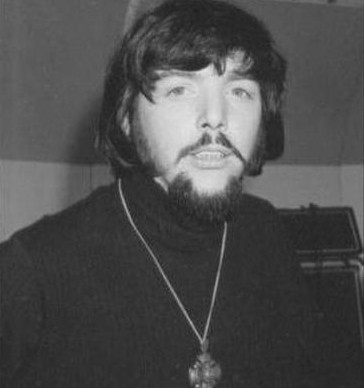 SB: Correct on both counts, and pleased to feature our work together on two of the Book’s companion CDS... At Original Sound, where the Ragamuffins did their experiments, studio inventions - Paul Buff was the engineer there at Original Sound. He was, at that time, constructing a ten-track machine. There was only two of them in the world. They were completely unheard of. One of them was in New York, and one he was working on at Original Sound. Paul Buff was an engineering genius, little known at all. We never really used that ten-track machine. I think we tried to use it on... I can’t recall now. But for the most part, we recorded on four tracks. But Paul had a way... Brian contributed to some degree to maintaining the bottom. He recognized what it was that I was after. I knew that I couldn’t be in two places at once. I couldn’t be out there in the studio performing the songs, and in the control booth monitoring the sound. So he and Paul made sure that the sound was captured. They both recognized the Machine’s style, and Paul did what he could to preserve it. But I doubt that it could have been messed with. It wasn’t something that could have been altered or overlooked in any way, 'cause it was something we had been developing for a half a year constantly, especially when you tuned the instruments down. It’s got to be there. Necessity becomes the mother of invention, basically is what happens, and that’s what happened there. Paul Buff and I spent a lot of time in the studio together. And I’d tell him, "No, this doesn’t sound right; the notes are right, but the sound is wrong; it sounds right in the studio, but it’s not coming across the tape." We would do this and do that, and he would tweak that and tweak this, and open up the bottom of the cabinet where all these wires were. He was completely ingenious, and yeah, yeah, there it is, that’s what we want. Wonderful engineer - never said a word. He was a slave to what you wanted. That’s all he focused on, was giving you what you wanted. So I was very fortunate in many ways, and that was one of them for sure.
SB: Correct on both counts, and pleased to feature our work together on two of the Book’s companion CDS... At Original Sound, where the Ragamuffins did their experiments, studio inventions - Paul Buff was the engineer there at Original Sound. He was, at that time, constructing a ten-track machine. There was only two of them in the world. They were completely unheard of. One of them was in New York, and one he was working on at Original Sound. Paul Buff was an engineering genius, little known at all. We never really used that ten-track machine. I think we tried to use it on... I can’t recall now. But for the most part, we recorded on four tracks. But Paul had a way... Brian contributed to some degree to maintaining the bottom. He recognized what it was that I was after. I knew that I couldn’t be in two places at once. I couldn’t be out there in the studio performing the songs, and in the control booth monitoring the sound. So he and Paul made sure that the sound was captured. They both recognized the Machine’s style, and Paul did what he could to preserve it. But I doubt that it could have been messed with. It wasn’t something that could have been altered or overlooked in any way, 'cause it was something we had been developing for a half a year constantly, especially when you tuned the instruments down. It’s got to be there. Necessity becomes the mother of invention, basically is what happens, and that’s what happened there. Paul Buff and I spent a lot of time in the studio together. And I’d tell him, "No, this doesn’t sound right; the notes are right, but the sound is wrong; it sounds right in the studio, but it’s not coming across the tape." We would do this and do that, and he would tweak that and tweak this, and open up the bottom of the cabinet where all these wires were. He was completely ingenious, and yeah, yeah, there it is, that’s what we want. Wonderful engineer - never said a word. He was a slave to what you wanted. That’s all he focused on, was giving you what you wanted. So I was very fortunate in many ways, and that was one of them for sure.
TM: After the Close LP you decided to "quit" music and started to 'transcendentalize' yourself.
SB: I started to go into my westernized guru era, and it affected every aspect of my life. I became fascinated with transcendental meditation, vegetarianism, the whole table-wrapping genre of eastern mysticism. This period of my life is both quite profound and humorous, and is the central theme behind the title of the book. Through it all, the one thing that did not change was composing. I always have, I still do. I don’t think a true songwriter has a choice. I don’t know what it’s like for others, but I know that I’m not psychologically healthy if I’m not writing. And I know that there are periods when I dry up a little. But I’m only working on something. I’ve come to recognize that - when becoming a little pensive or non-communicative. I know then, that there’s something cooking on the inside. And sure enough, if I take the time to allow it to come out of me, then it does.
TM: It’s a fact that you have much more "followers" today (or from the 80s till today) than you had in the 60s. Do you think that this has something to do with your "contribution" to the punk sound? After all they don’t call you "The Godfather of Punk" for nothing!
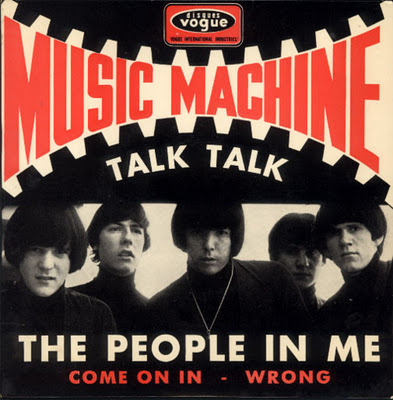 SB: The 60s era of music was the beginning of something that we’re only now beginning to understand. There were no guidelines, the music industry, the record market - everything about it, was untried. There were no standard contracts and no standard approaches to a hit record. If you listen to the Top 10 for the years between '65 through '69, it’s all over the map. The free expression of the songwriter and the artist was basically unhindered - or only hindered by him or herself - as the case may have been. I prefer the Music Machine to be regarded as a progenitor of art rock, so it’s not so much that I’m the grandfather of punk - which isn’t a self-named designation; this was given to me by rock historians who recognize the early beginnings of a genre that I contributed to. I see that now. I never saw it before. If you talk to Mike Stax, when he came to interview me in Los Angeles (in the early 1980s), I’m sure he’ll tell you that I was astounded that anybody even remembered me, that there was any interest at all in the Music Machine. I was totally unprepared for it, in fact, I didn’t believe it at first. Once they found or rediscovered me - or however you want to put it, and people began to contact me, I really didn’t know what they were talking about. I couldn’t relate to the commercial market as it had evolved. What they were saying was that it evolved because of artists like the Music Machine, that as a songwriter, I had made a contribution to its evolution. Now that’s really hard to believe. It’s still hard for me to believe. I don’t know what value to place on my body of work, I really don’t. I may have contributed to its iconic nuance, but I am not singularly an icon of the era - unless people choose to place me there. If you really have a burning desire to create music uniquely your own, then you’ll do it. You’ll find a way to have it recorded. I hate to say this, but I think I’ve got hit songs hiding in my archives. By that I mean, I think I’ve got songs that are hits - though the time of their genera has passed. I’ve got stacks of them, boxes and boxes of tapes and songs in all generas -- and there must be hundreds of songs that I haven’t finished. Some that are finished express the commercial aspects of the time while retaining an individuality that seems to mark my compositions. Of course, that’s a little presumptuous. But I don’t mean it to sound that way…
SB: The 60s era of music was the beginning of something that we’re only now beginning to understand. There were no guidelines, the music industry, the record market - everything about it, was untried. There were no standard contracts and no standard approaches to a hit record. If you listen to the Top 10 for the years between '65 through '69, it’s all over the map. The free expression of the songwriter and the artist was basically unhindered - or only hindered by him or herself - as the case may have been. I prefer the Music Machine to be regarded as a progenitor of art rock, so it’s not so much that I’m the grandfather of punk - which isn’t a self-named designation; this was given to me by rock historians who recognize the early beginnings of a genre that I contributed to. I see that now. I never saw it before. If you talk to Mike Stax, when he came to interview me in Los Angeles (in the early 1980s), I’m sure he’ll tell you that I was astounded that anybody even remembered me, that there was any interest at all in the Music Machine. I was totally unprepared for it, in fact, I didn’t believe it at first. Once they found or rediscovered me - or however you want to put it, and people began to contact me, I really didn’t know what they were talking about. I couldn’t relate to the commercial market as it had evolved. What they were saying was that it evolved because of artists like the Music Machine, that as a songwriter, I had made a contribution to its evolution. Now that’s really hard to believe. It’s still hard for me to believe. I don’t know what value to place on my body of work, I really don’t. I may have contributed to its iconic nuance, but I am not singularly an icon of the era - unless people choose to place me there. If you really have a burning desire to create music uniquely your own, then you’ll do it. You’ll find a way to have it recorded. I hate to say this, but I think I’ve got hit songs hiding in my archives. By that I mean, I think I’ve got songs that are hits - though the time of their genera has passed. I’ve got stacks of them, boxes and boxes of tapes and songs in all generas -- and there must be hundreds of songs that I haven’t finished. Some that are finished express the commercial aspects of the time while retaining an individuality that seems to mark my compositions. Of course, that’s a little presumptuous. But I don’t mean it to sound that way…
Επίσης θα ήθελα να μοιραστώ μαζί σας, το τελευταίο e-mail που ανταλλάξαμε με τον Sean…
"Friends & fans of the planet --
Its been low key around here thank the Lord, the Gardner/'helper' moved to Oregon last week, relieving noisy activities which, for the most part, were altogether unnecessary. We've had a few days in the low 90's with the majority in the mid 80's; I devised a conduit for the overflow from the swamp cooler, providing fresh water for my trees and plants. The animals -- most of which have no other reliable source -- gather according to prominence the horses, the dogs, one duck, cottentails, squirrels, chickens and a variety of wild birds take their turn with little or no conflict. To my delight, the birds (and sometimes the horses) camp in close proximity to the window next to my computer when I'm working on music... currently, their favorite song is "Be Kind To All The Animals" (-- aka -- "Country Hearted Things").
I remain grateful for your friendship and prayers; the Lord's grace be with each and every one of you... SΒ"
Sean Bonniwell… Ωριμότερος όσο ποτέ, σοφότερος όσο ποτέ, πιο κοντά στον Θεό όσο ποτέ…
Όσον αφορά το τραγούδι που λέει ο Sean, δεν ξέρω αν είναι το τελευταίο που έγραψε (άλλωστε δεν παίζει και κάποιο ρόλο), σίγουρα είναι από τα τελευταία του και πιστεύω πως είναι αντιπροσωπευτικό της κατεύθυνσής του. Μην περιμένετε άλλον ένα garage ύμνο, οι ένδοξες μέρες των Music Machine έχουν περάσει, απλά έκατσε στο πιάνο του και έγραψε ένα τραγούδι για τα «άλλα» δημιουργήματα του θεού, τα ζώα. «Να είστε ευγενικοί σε όλα τα ζώα…»
Δεν θα είχε απολύτως καμμία σημασία να κρατήσω αυτό το τραγούδι στα «συρτάρια» μου. Είμαι σίγουρος πως και ο Sean θα ήθελε να το μοιραστεί με τον κόσμο… Οπότε, ορίστε…
SEAN BONNIWELL: "COUNTRY HEARTED THINGS"
Θα μπορούσα να σας γράψω και άλλα πολλά. Να αναφέρω αρκετές από τις διαδικτυακές μας συνομιλίες. Θα μπορούσα επίσης να σας αναφέρω την προσπάθεια που έγινε πριν λίγο καιρό μέσω εμένα, του Σπήλιου και της Lana (σσ. Loveland) να έρθει ο Sean να παίξει στην Ελλάδα. Ο ίδιος ήταν θετικός… Τέλος πάντων… Θα κλείσω με την εικόνα που έχει καρφωθεί στο μυαλό μου, τις τελευταίες αυτές ώρες που ετοίμαζα αυτό το κειμενάκι για το Wild Thing. Ο Sean, μόλις έχει τελειώσει την ερμηνεία του "Hey Joe", λίγο πιο κει ο Jimi προσπαθεί να αλλάξει μία χορδή στην κιθάρα του, και έτσι ο Sean βρίσκει λίγο χρόνο και ευχαριστεί, Αυτόν, που ήταν εκεί, εκεί, πέρα από το Garage, και τον περίμενε…
We’re Gonna Miss You Dark White Prince…
Μερικές φωτογραφίες:

Το πρώτο εξώφυλλο που σχεδίασα για το 2ο τεύχος του TimeMazine, σαφώς επηρεασμένο από τους Music Machine, και ακόμα δεν μπορώ να καταλάβω γιατί το απέρριψα…
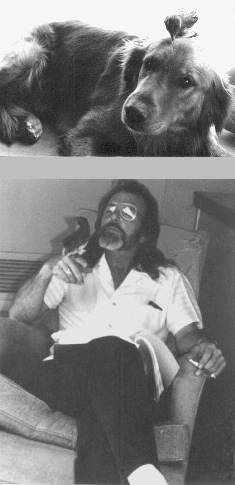
Μου την έστειλε ο Sean για να μου δείξει την αγάπη του προς το ζωικό βασίλειο…
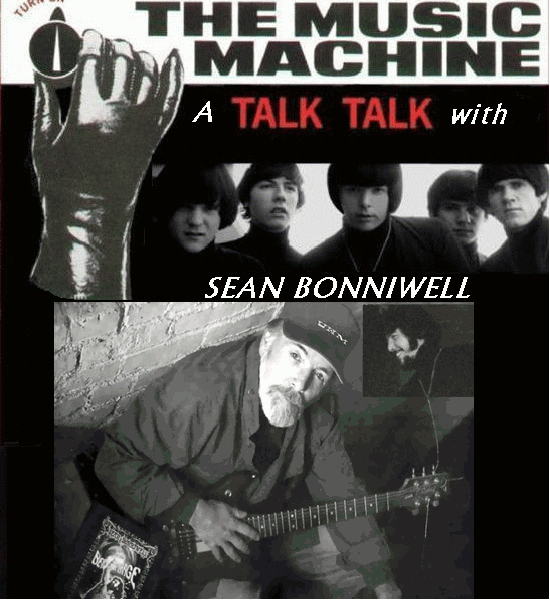
Ένα κολάζ από τον Sean, για το πώς θα προτιμούσε το εξώφυλλο…
Η τελευταία σελίδα, της 10σέλιδης συνέντευξης, με την δισκογραφία …
Χωρίς σχόλια… από τον προσωπικό μου θησαυρό…
Tags: Sean Bonniwell, The Music Machine
Best sounds of 2013
by Timelord Michalis:
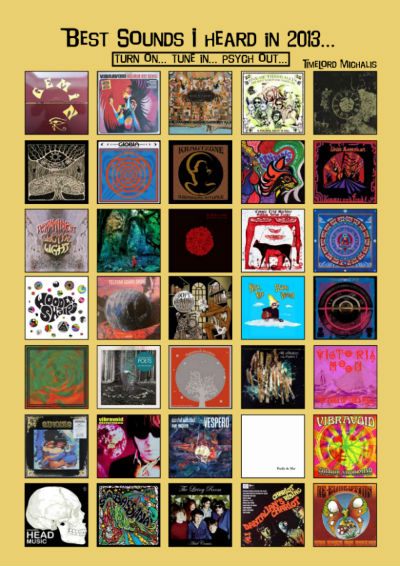
I. Albums:
(Note: two No. 1s and fourteen No. 11s)
11. THE LUCK OF EDEN HALL - Victoria Moon (self-released)
11. THE MOVEMENTS - Like Elephants 1 (Crusher Records)
11. PARIR meets ELECTRIC MOON - The Paper Moon Sessions (Sulatron Records)
11. TECHNICOLOR POETS - All That Is Solid (Kommun2)
11. NIGHT BEATS - Sonic Bloom (The Reverberation Appreciation Society)
11. THE ENTRANCE BAND - Face the Sun (Beyond Beyond Is Beyond)
11. NICK RIFF - Escape Velocity (Riffdisc /Cosmic Eye Music)
11. SOFT HEARTED SCIENTISTS - Whatever Happened to The Soft Hearted Scientists (FdM Vol.38, Fruits de Mer)
11. TELSTAR SOUND DRONE - Comedown (Bad Afro Records)
11. WOODEN SHJIPS - Back to Land (Thrill Jockey)
11. LAMP OF THE UNIVERSE - Transcendence (Clostridium Records)
11. COSMIC TRIP MACHINE - Golden Horus Name (Nasoni Records)
11. NO MAN'S LAND - Unprotected (Anazitisi Records)
11. GARDNER JACCO - Cabinet of Curiosities (Trouble In Mind Records)
10. PERMANENT CLEAR LIGHT - Beyond These Things (Havasupai Records)
09. SPIDS NOGENHAT - Kommer Med Fred (Bad Afro Records)
08. SENDELICA - The Kaleidoscopic Kat and its Autoscopic Ego (Vincebus Eruptum Records)
07. KRAUTZONE - Kosmische Rituale (Sulatron Records)
06. GIOBIA - Introducing Night Sound (Sulatron Records)
05. KIKAGAKU MOYO - Kikagaku Moyo (Cosmic Eye / Sound Effect Records)
04. THE DEAD-END ALLEY BAND - Whispers of the Night (Nasoni Records)
03. ONE OF THESE DAYS & THEE HEAVY RANDOM TONE COLOUR LAB - A Peaceful Nacht in Hell (self-released)
02. ROSE WINDOWS - The Sun Dogs (Sub Pop Records)
01. ii. VIBRAVOID - Delirio dei Sensi (Go Down Records)
01. i. PURPLE OVERDOSE - Gemineye (The last ever recordings) (Anazitisi Records)
II. Various / re-issues / EPs / singles:
(Note: except No. 1, all others in alphabetical order)
* DANTALIAN'S CHARIOT - Chariot Rising (LP, Wah Wah)
* DEAN ALLEN FOYD - Dean Allen Foyd (10"EP, Crusher Records)
* DREAM - Rebellion (LP, Pseudonym)
* ELECTRIC MOON - You Can See the Sound of... (10"EP, Sulatron Records)
* GOAT - Live Ballroom Ritual (2LP, Rocket)
* LIVING ROOM - Acid Comes (LP, World In Sound)
* SPACE AGENCY - "Bombay Potatoes" / "Purple Power" (7", Market Square Records)
* SULA BASSANA - Dreamer (10-year anniversary) (LP, Sulatron Records)
* VARIOUS ARTISTS - Re-Evolution: FdM Sings The Hollies (LP, Fruits de Mer)
* VARIOUS ARTISTS - Shrunken Head Music (2x7", Fruits de Mer)
* VARIOUS ARTISTS - The White (7"EP, Fruits de Mer)
* VESPERO - "Careful With That Axe, Eugene" (7", Fruits de Mer)
* VIBRAVOID - Colour Your Mind (7"EP, Fruits de Mer)
* VIBRAVOID - Distortions [Re-mastered] (2LP, Stoned Karma)
1.SIMONES - 20th Anniversary (4LP box-set, Headspin Records)
